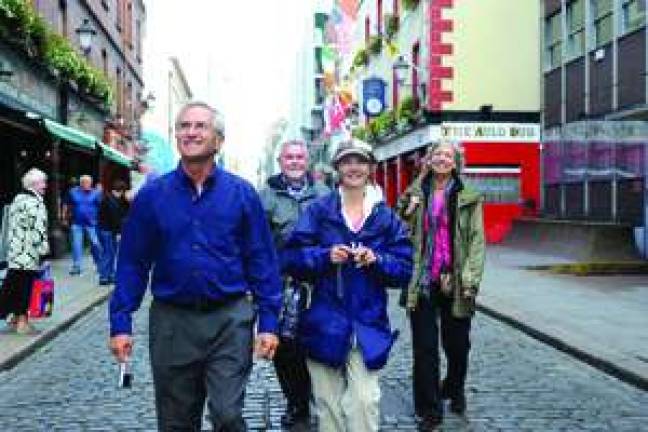Seniors Hit the Road to Learn and Travel

By Ellen Keohane About a year and a half ago, writer Dick Pollak and his wife Diane Walsh, a pianist, decided to sublet their Upper West Side apartment and travel around the world. But first, Walsh had scheduled performances in California and Iowa-with a break in between. "We had some time to kill in California," Pollak, 78, explained. So in March of 2011, the couple signed up for a Road Scholar program called "Magical Monterey." According to Pollak's travel blog (You're Only Old Once), the Monterey trip included "about two dozen other graying travelers." While staying at Hidden Valley, an arts center in Carmel Valley, Pollak and his fellow Road Scholars attended a winemaking lecture, musical performances, dance-inspired exercise classes, a Monterey Bay Aquarium field trip and a scenic bus trip along 17-Mile Drive, among other activities. "It was a positive experience," Pollak said. Founded in 1975, the Boston-based nonprofit travel organization changed its name from Elderhostel to Road Scholar a little over two years ago. "There was this misperception of what the programs were like," explained Despina Gakopoulos, a spokesperson for the organization. The word "hostel" gave people the mistaken impression that they'd be staying in sparse or dorm-like accommodations, she said. And not everyone wants to be associated with the word "elder," she added. Originally, the organization offered programs on college and university campuses. While many Road Scholar trips continue to be associated with educational institutions, others are not. So while some participants (like Pollak and his wife) may find themselves bunking in a dorm, those on other trips may stay at a hotel or inn. Every Road Scholar trip has an educational focus. "We use local experts and instructors as opposed to a tour guide, so you really learn in depth about whatever topic or area you're studying or visiting," Gakopoulos said. In 2011, more than 100,000 people attended Road Scholar programs around the globe, Gakopoulos said. The organization offers about 6,500 programs in 50 U.S. states and 150 countries. In the past, the age requirement for all programs used to be 55 and over. Road Scholar, however no longer has an age requirement for its programs. Road Scholar's U.S.-based programs average about $150 a day, while its international programs are about $288 a day (excluding airfare). "Being a nonprofit, we try to keep the cost down as much as we can," Gakopoulos said. The price of a program typically includes accommodations, lectures, activities, most meals (unless noted), taxes, gratuities and transportation within the program, as well as a travel assistance and insurance plan, she said. For those who may perceive a Road Scholar program as financially out of reach, the nonprofit offers needs-based scholarships of up to $800 for its U.S. based programs, Gakopoulos said. Most U.S. programs tend to be about six days in length, while international ones are roughly 13 days. Internationally, programs in Costa Rica, Italy, France and the United Kingdom tend to attract a lot of people, Gakopoulos said. More recently, Road Scholar started offering programs in Cuba, which have been "phenomenally popular," she said. "We were granted a [people-to-people] license to operate programs there last year that was renewed again this year," she explained. One eight-night trip named "Cuba Today: People and Society" includes an intercultural exchange at a middle-class family home. The Road Scholar website categorizes its programs by location as well as by interest. And every program has an activity level rating ranging from physically easy to challenging, Gakopoulos said. "So people can choose what makes the most sense for them," she added. But it's not just the educational activities that make Road Scholar Trips unique, Gakopoulos said. It is the sense of community created among people sharing the same interests, she added. When asked what he enjoyed most about the Monterey trip, Pollak spoke of a spirited conversation at dinner with a table of birders. "They proved to be a quite interesting and very varied group from all over the country, and we had quite a jolly time," he said. "As I recall, we didn't talk much about birds." Although Pollak and his wife typically "don't do organized groups," he said they would be open to going on another Road Scholar trip in the future. "The only negative was the rain-that's hardly Road Scholar's fault," said Pollak.